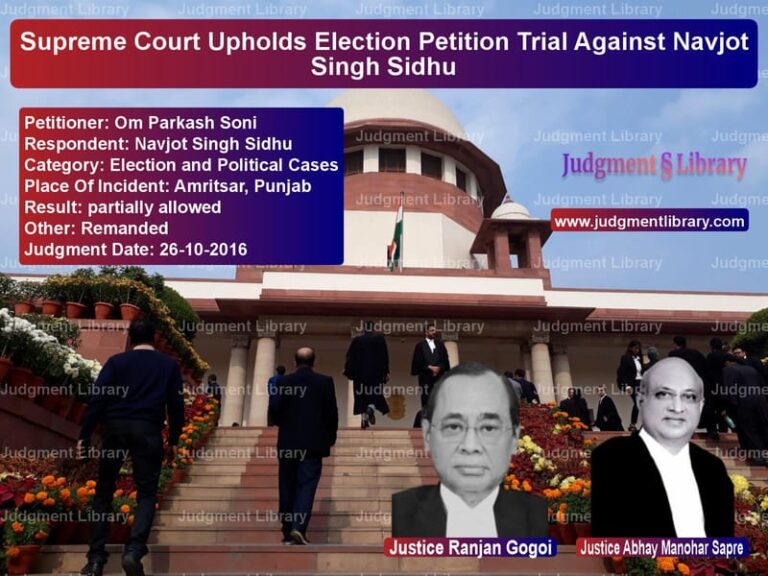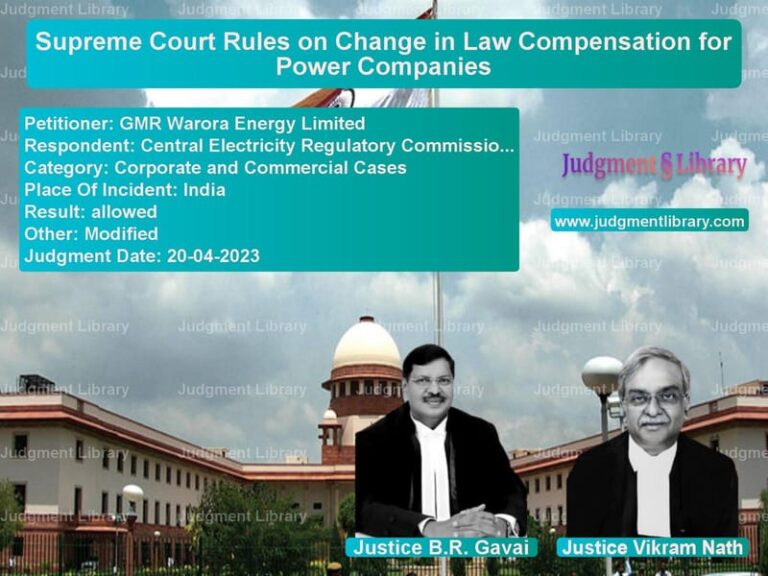Acquittal in Murder Case: Supreme Court Rejects State’s Appeal Due to Lack of Evidence
The case of State of Himachal Pradesh vs. Naveen Kumar is a crucial ruling that reaffirms the legal principles governing criminal trials, particularly in cases of acquittal. The Supreme Court of India, in its judgment on October 4, 2018, addressed the evidentiary standards required to convict an accused and whether an acquittal can be overturned in the absence of strong corroborative proof.
The case involved allegations of murder where the prosecution sought to convict the accused based on a delayed witness statement and the alleged recovery of a weapon. However, the Supreme Court upheld the High Court’s decision to acquit the accused, emphasizing that the burden of proof in criminal cases lies entirely on the prosecution and that any doubt should benefit the accused.
Background of the Case
The case originates from a First Information Report (FIR) lodged on September 10, 1999, regarding an incident in Himachal Pradesh. The police received a report that eight individuals had formed an unlawful assembly and attacked three individuals—Rajiv Kumar, Raj Kumar, and Santokh Singh—leading to their deaths. The accused allegedly used weapons such as swords, hockey sticks, and clutch wires to commit the crime.
After the FIR was registered at 9:35 p.m., the police conducted an investigation, leading to the arrest of multiple individuals, including Naveen Kumar. The prosecution’s case against Naveen Kumar was largely based on a witness statement recorded much later and the alleged recovery of a clutch wire that was purportedly used in the attack.
Arguments by the Appellant (State of Himachal Pradesh)
The prosecution argued that:
- The accused was identified by two injured eye-witnesses, PW-1 Ashwani Kumar and PW-2 Ram Pal, who had survived the attack.
- PW-1 and PW-2 had stated that Naveen Kumar was part of the group that attacked the victims.
- A clutch wire was allegedly recovered at the instance of the accused, linking him to the crime.
- The trial court had relied on these statements and the forensic evidence to convict Naveen Kumar.
Arguments by the Respondent (Naveen Kumar)
The defense raised the following key points:
- Naveen Kumar’s name was not mentioned in the original FIR, which raised serious doubts about his involvement.
- The witness statements were recorded much later and lacked independent corroboration.
- The recovered clutch wire was a common object and was not conclusively linked to the crime.
- The injuries mentioned in the medical report did not match the alleged weapon of attack.
- The prosecution had failed to provide a clear motive for why Naveen Kumar would participate in the attack.
Trial Court’s Verdict
The trial court, based on the witness statements and the recovery of the clutch wire, convicted Naveen Kumar under Section 302 of the Indian Penal Code (IPC). It sentenced him to life imprisonment, relying heavily on the statements of PW-1 and PW-2.
High Court’s Reversal
The High Court overturned the conviction and acquitted Naveen Kumar on the following grounds:
- His name was not mentioned in the initial FIR, which cast doubt on the veracity of the prosecution’s case.
- The eye-witness statements were recorded after a considerable delay, making them unreliable.
- The forensic evidence linking the clutch wire to the murder was not conclusive.
- There was no direct evidence proving Naveen Kumar’s involvement beyond a reasonable doubt.
Supreme Court’s Analysis and Judgment
The Supreme Court carefully scrutinized whether the prosecution had met the burden of proving the accused’s guilt beyond a reasonable doubt.
Key Observations of the Court
- On the absence of Naveen Kumar’s name in the FIR: The Court noted that when an FIR is lodged immediately after an incident, it is expected to contain the names of all known accused persons. The absence of Naveen Kumar’s name raised a substantial doubt about his involvement.
- On the reliability of witness statements: The Court found that the prosecution had failed to provide a plausible explanation for the delay in recording the witness statements.
- On the clutch wire as evidence: The Court ruled that the recovery of a clutch wire alone was insufficient to convict the accused without further forensic corroboration.
- On the standard of proof: The Court reiterated that in criminal cases, the prosecution must prove the accused’s guilt beyond a reasonable doubt. Since the evidence in this case was not conclusive, the accused was entitled to acquittal.
Final Ruling
- The Supreme Court dismissed the appeal, upholding the High Court’s acquittal of Naveen Kumar.
- The Court emphasized that acquittals cannot be overturned unless the prosecution presents strong, independent evidence.
- It reaffirmed the principle that any reasonable doubt must benefit the accused.
Impact of the Judgment
The ruling has significant implications for criminal trials in India:
- It reinforces the principle that delayed witness statements must be scrutinized carefully.
- It highlights the importance of independent corroborative evidence in securing convictions.
- It ensures that acquittals are not overturned unless there is compelling evidence.
- It upholds the principle that the burden of proof lies entirely on the prosecution.
Conclusion
The Supreme Court’s decision in State of Himachal Pradesh vs. Naveen Kumar is a vital reaffirmation of the principle that an accused cannot be convicted based on weak and unreliable evidence. The judgment ensures that courts remain cautious while assessing delayed witness statements and forensic evidence, thereby protecting the rights of the accused and upholding the rule of law.
Petitioner Name: State of Himachal Pradesh.Respondent Name: Naveen Kumar.Judgment By: Justice N.V. Ramana, Justice Mohan M. Shantanagoudar.Place Of Incident: Himachal Pradesh.Judgment Date: 04-10-2018.
Don’t miss out on the full details! Download the complete judgment in PDF format below and gain valuable insights instantly!
Download Judgment: State of Himachal Pr vs Naveen Kumar Supreme Court of India Judgment Dated 04-10-2018.pdf
Direct Downlaod Judgment: Direct downlaod this Judgment
See all petitions in Bail and Anticipatory Bail
See all petitions in Murder Cases
See all petitions in Judgment by N.V. Ramana
See all petitions in Judgment by Mohan M. Shantanagoudar
See all petitions in dismissed
See all petitions in Declared Infructuous
See all petitions in supreme court of India judgments October 2018
See all petitions in 2018 judgments
See all posts in Criminal Cases Category
See all allowed petitions in Criminal Cases Category
See all Dismissed petitions in Criminal Cases Category
See all partially allowed petitions in Criminal Cases Category







